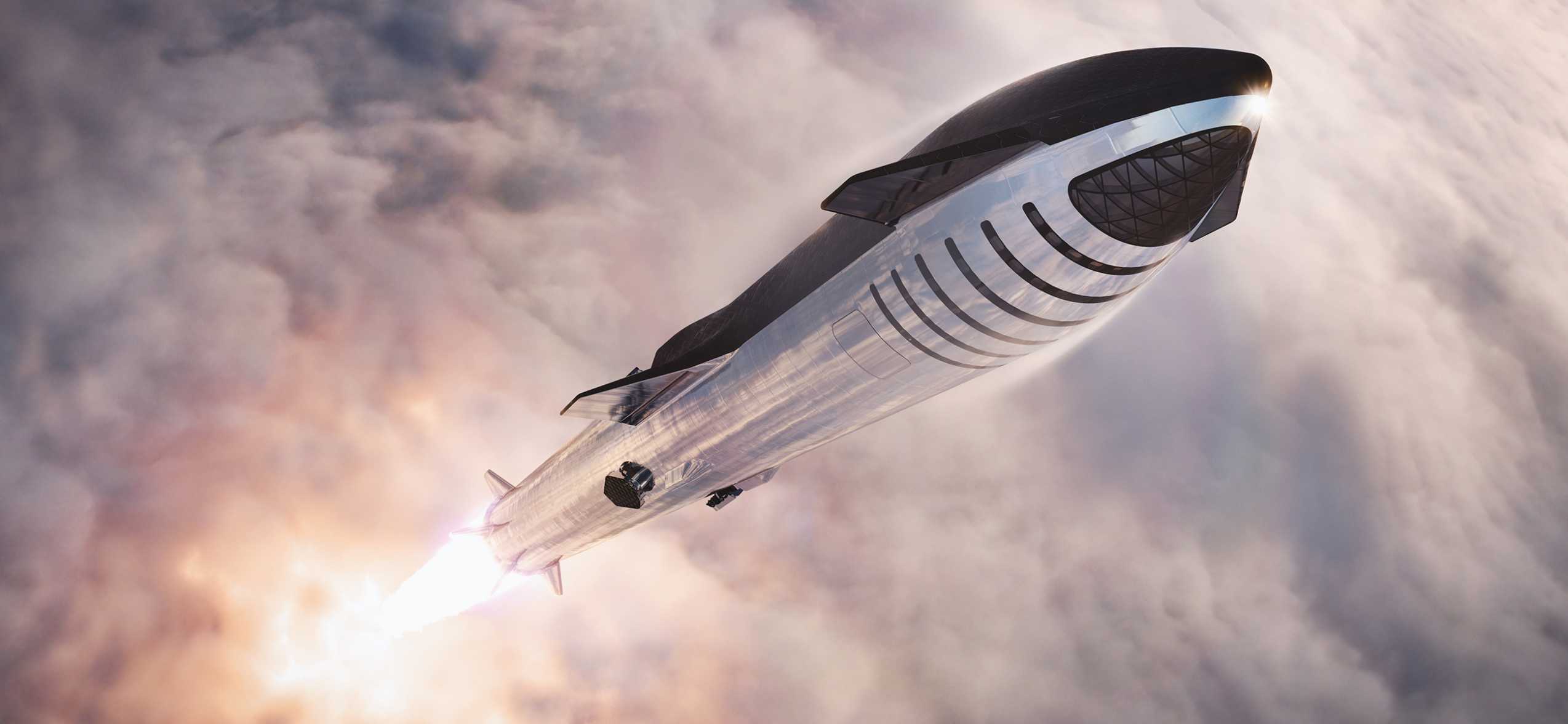
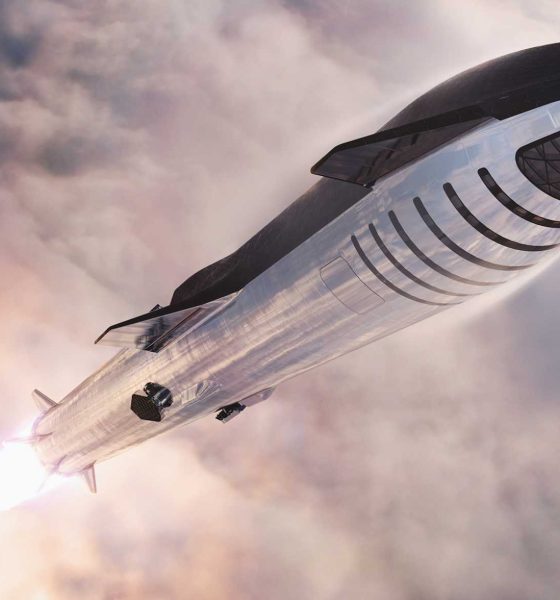
News
SpaceX’s orbital Starship launch debut could still happen this year
Despite the spectacular demise of a full-scale prototype just days ago, a senior SpaceX engineer and executive believes that Starship could still be ready for its first orbital launch attempt before the end of the year.
Even if the first launch attempt fails, that milestone – if realized – would be one of the single biggest upsets in the history of spaceflight, proving that Saturn V-scale orbital-class rockets can likely be built in spartan facilities with common materials for pennies on the dollar. Much like Falcon 1 suffered three launch failures before successfully reaching orbit, there’s a strong chance that Starship’s first shot at orbit will fall short, although each full-up launch failure would likely cost substantially more than the current prototypes being routinely tested to destruction in South Texas.
Most recently, what CEO Elon Musk later described as a “a minor test of a quick disconnect” went wrong in a spectacular fashion, causing a major liquid methane leak that subsequently ignited and created a massive explosion. Although Starship SN4 did technically complete its fifth Raptor engine static fire test just a minute or so prior, the ship and its immediate surroundings were obliterated by the violent explosion, leaving little more than steel shrapnel and the broken husk of a launch mount behind. It’s in this context that one of SpaceX’s most levelheaded, expert executives believes that an orbital launch could still happen this year.
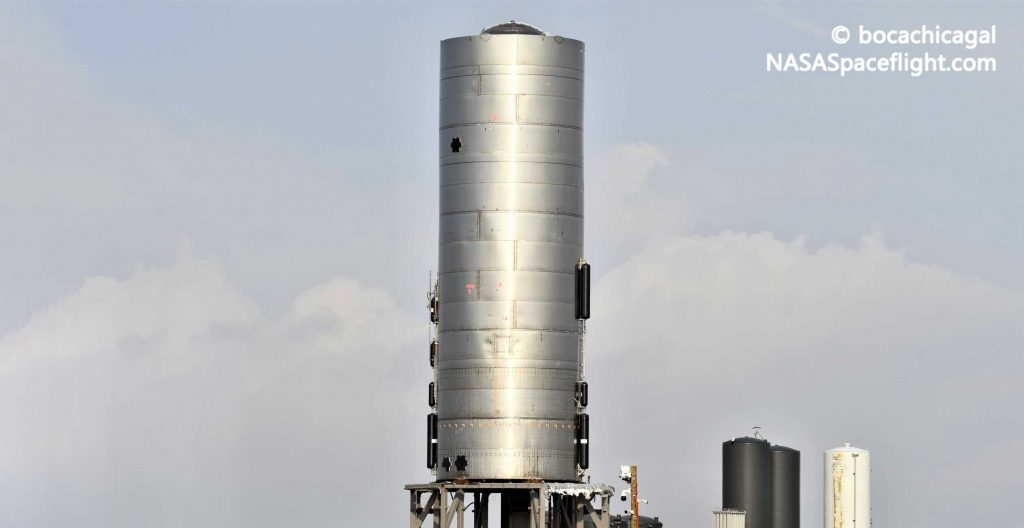
While Starship SN4’s demise and the continued possibility of the ship’s orbital launch debut occurring less than seven months from now may seem at odds with each other, that’s actually just a side effect of the approach SpaceX has always taken when developing brand new rockets and spacecraft. Following the lead of the scrappy teams that used the exact same methods to design, test, and fly the massive Saturn rockets that took humans to the Moon, SpaceX has always preferred to learn by doing.
Inevitably, testing minimum viable products to their limits will lead to failures, but those failures are actually extremely valuable so long as they are extensively analyzed and learned from. That’s exactly what SpaceX has been doing for the last six or so months with full-scale Starship prototypes: building, testing, failing, and improving in an unending cycle. Built slowly with inferior methods, Starship Mk1 almost immediately during its first pressure test in November 2019. SpaceX took that failure, extracted all the insight it could, and dramatically improved its production methods before completing Starship SN1 barely three months later.
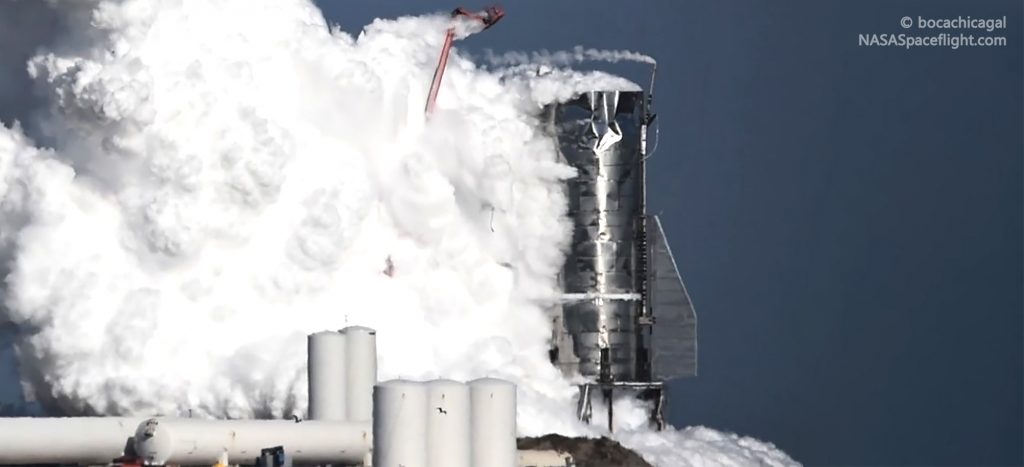
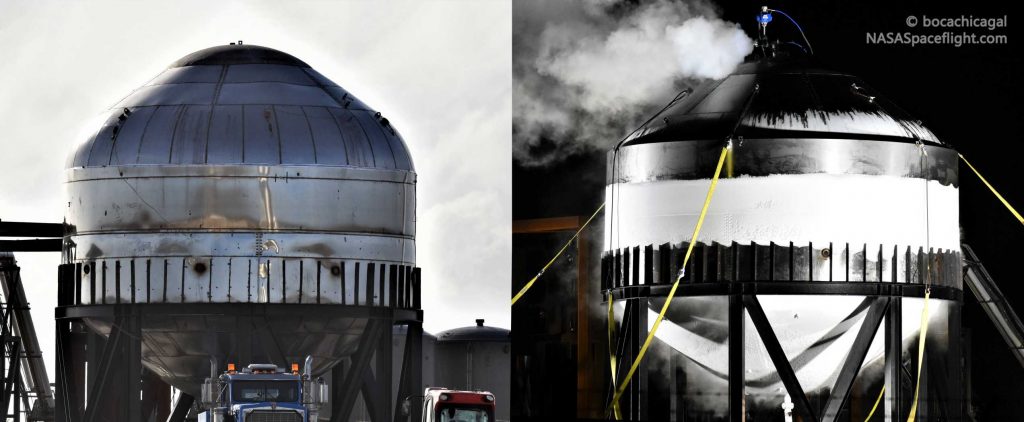
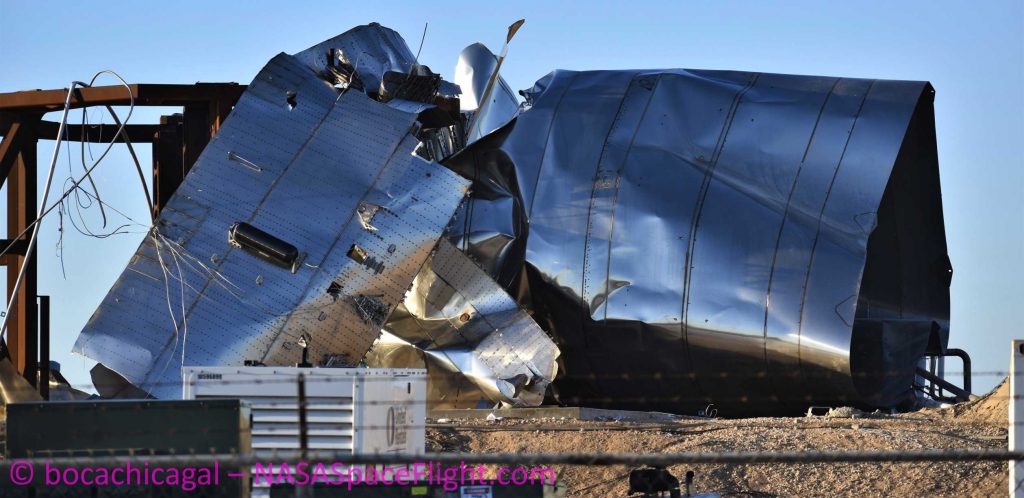
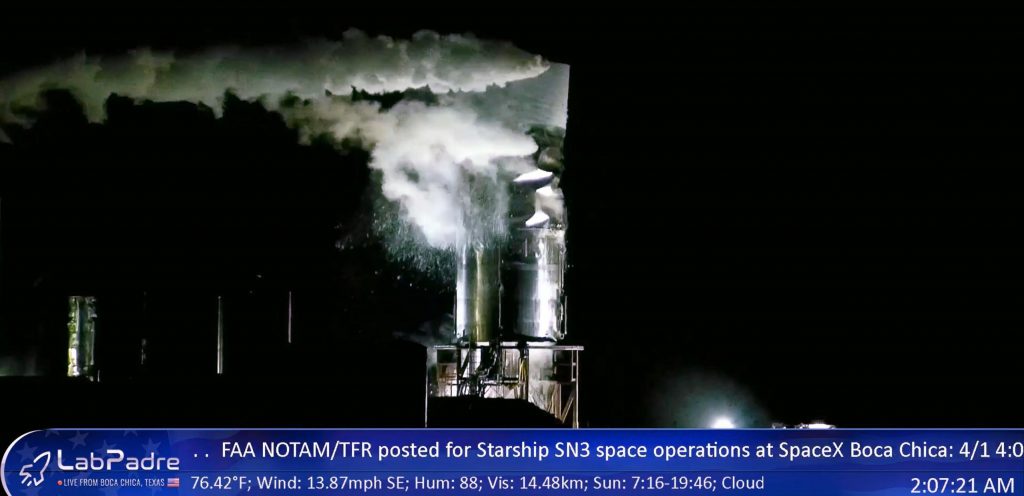
Prior to SN1, SpaceX built and tested two stout test tanks to failure, ultimately achieving pressures of ~8.5 bar – sufficient for reliable human spaceflight – with the second tank on January 30th, 2020. On February 28th, Starship SN1 was unfortunately destroyed by a faulty ‘thrust puck’ (Raptor engine mount). Just 10 days later, SpaceX successfully tested a third ad-hoc test tank, proving that it had already rectified the engine section design flaw. Hardware isn’t always the only problem, however, and Starship SN3 was destroyed by human operator error during a cryogenic proof test on April 3rd.
Starship SN4 was completed and moved to the launch pad less than a month later and began testing just a few days after that, quickly racking up milestones as it became the first full-scale prototype to pass cryogenic proof testing, perform a wet dress rehearsal (WDR) with real propellant, fire up a Raptor engine, and complete a more ambitious cryogenic pressure test. Prior to the ground systems fuel leak that killed it, SN4 was possibly just days away from attempting the inaugural flight of a full-scale Starship prototype.
With Starship SN4 now steel confetti, Starship SN5 – effectively complete – will likely take over where its predecessor left off, heading to the launch pad within the next week or so before attempting a cryogenic pressure test and Raptor static fire to clear it for flight. Per Koenigsmann, that flight debut could come just a few weeks from now – likely before the end of June if replacement ground equipment can be quickly completed. If Starship SN5 survives that hop debut, it may ultimately be upgraded with a nosecone, flaps, and two additional Raptor engines to perform a dramatic 20 km (~12 mi) flight, capped with a supersonic skydiver-style reentry and landing test.
Once that capability has been successfully demonstrated, Super Heavy development and orbital Starship operation and reentry are the next critical hurdles. If Koenigsmann is correct, it’s safe to say that the first fully heat-shielded Starships and the beginnings of the first one or several Super Heavy booster prototypes will begin to appear in South Texas within the next few months.
Check out Teslarati’s Marketplace! We offer Tesla accessories, including for the Tesla Cybertruck and Tesla Model 3.

News
Tesla wins another award critics will absolutely despise
Tesla earned an overall score of 49 percent, up 6 percentage points from the previous year, widening its lead over second-place Ford (45 percent, up 2 points) to a commanding 4-percentage-point gap. The company also excelled in the Fossil Free & Environment category with a 50 percent score, reflecting strong progress in reducing emissions and decarbonizing operations.

Tesla just won another award that critics will absolutely despise, as it has been recognized once again as the company with the most sustainable supply chain.
Tesla has once again proven its critics wrong, securing the number one spot on the 2026 Lead the Charge Auto Supply Chain Leaderboard for the second consecutive year, Lead the Charge rankings show.
NEWS: Tesla ranked 1st on supply chain sustainability in the 2026 Lead the Charge auto/EV supply chain scorecard.
“@Tesla remains the top performing automaker of the Leaderboard for the second year running, and increased its overall score by 6 percentage points, while Ford only… pic.twitter.com/nAgGOIrGFS
— Sawyer Merritt (@SawyerMerritt) March 4, 2026
This independent ranking, produced by a coalition of environmental, human rights, and investor groups including the Sierra Club, Transport & Environment, and others, evaluates 18 major automakers on their efforts to build equitable, sustainable, and fossil-free supply chains for electric vehicles.
Tesla earned an overall score of 49 percent, up 6 percentage points from the previous year, widening its lead over second-place Ford (45 percent, up 2 points) to a commanding 4-percentage-point gap. The company also excelled in the Fossil Free & Environment category with a 50 percent score, reflecting strong progress in reducing emissions and decarbonizing operations.
Perhaps the most impressive achievement came in the batteries subsection, where Tesla posted a massive +20-point jump to reach 51 percent, becoming the first automaker ever to surpass 50 percent in this critical area.
Tesla achieved this milestone through transparency, fully disclosing Scope 3 emissions breakdowns for battery cell production and key materials like lithium, nickel, cobalt, and graphite.
The company also requires suppliers to conduct due diligence aligned with OECD guidelines on responsible sourcing, which it has mentioned in past Impact Reports.
While Tesla leads comfortably in climate and environmental performance, it scores 48 percent in human rights and responsible sourcing, slightly behind Ford’s 49 percent.
The company made notable gains in workers’ rights remedies, but has room to improve on issues like Indigenous Peoples’ rights.
Overall, the leaderboard highlights that a core group of leaders, Tesla, Ford, Volvo, Mercedes, and Volkswagen, are advancing twice as fast as their peers, proving that cleaner, more ethical EV supply chains are not just possible but already underway.
For Tesla detractors who claim EVs aren’t truly green or that the company cuts corners, this recognition from sustainability-focused NGOs delivers a powerful rebuttal.
Tesla’s vertical integration, direct supplier contracts, low-carbon material agreements (like its North American aluminum deal with emissions under 2kg CO₂e per kg), and raw materials reporting continue to set the industry standard.
As the world races toward electrification, Tesla isn’t just building cars; it’s building a more responsible future.
News
Tesla Full Self-Driving likely to expand to yet another Asian country
“We are aiming for implementation in 2026. [We are] doing everything in our power [to achieve this],” Richi Hashimoto, president of Tesla’s Japanese subsidiary, said.

Tesla Full Self-Driving is likely to expand to yet another Asian country, as one country seems primed for the suite to head to it for the first time.
The launch of Full Self-Driving in yet another country this year would be a major breakthrough for Tesla as it continues to expand the driver-assistance program across the world. Bureaucratic red tape has held up a lot of its efforts, but things are looking up in some regions.
Tesla is poised to transform Japan’s roads with Full Self-Driving (FSD) technology by 2026.
Richi Hashimoto, president of Tesla’s Japanese subsidiary, announced the ambitious timeline, building on successful employee test drives that began in 2025 and earned positive media reviews. Test drives, initially limited to the Model 3 since August 2025, expanded to the Model Y on March 5.
Once regulators approve, Over-the-Air (OTA) software updates could activate FSD across roughly 40,000 Teslas already on Japanese roads. Japan’s orderly traffic and strict safety culture make it an ideal testing ground for autonomous driving.
Hashimoto said:
“We are aiming for implementation in 2026. [We are] doing everything in our power [to achieve this].”
The push aligns with Hashimoto’s leadership, which has been credited for Tesla’s sales turnaround.
In 2025, Tesla delivered a record 10,600 vehicles in Japan — a nearly 90% jump from the prior year and the first time exceeding 10,000 units annually.
BREAKING 🇯🇵 FSD IS LIKELY LAUNCHING IN JAPAN IN 2026 🚨
Richi Hashimoto, President of Tesla’s Japanese subsidiary, stated: “We are aiming for implementation in 2026” and added that they are “doing everything in our power” to achieve this 🔥
Test drives in Japan began in August… pic.twitter.com/jkkrJLszXN
— Ming (@tslaming) March 5, 2026
The strategy shifted from online-only sales to adding 29 physical showrooms in high-traffic malls, plus staff training and attractive financing offers launched in January 2026. Tesla also plans to expand its Supercharger network to over 1,000 points by 2027, boosting accessibility.
This Japanese momentum reflects Tesla’s broader international expansion. In Europe, Giga Berlin produced more than 200,000 vehicles in 2025 despite a temporary halt, supplying over 30 markets with plans for sequential production growth in 2026 and battery cell manufacturing by 2027.
While regional EV sales faced headwinds, the factory remains a cornerstone for Model Y deliveries across the continent.
In Asia, Giga Shanghai continues to be recognized as Tesla’s powerhouse. China, the company’s largest market, saw January 2026 deliveries from the plant rise 9 percent year-over-year to 69,129 units, with affordable new models expected later this year.
FSD advancements, already progressing in the U.S. and South Korea, are slated for Europe and further Asian rollout, complementing plans to expand Cybercab and Optimus to new markets as well.
With OTA-enabled autonomy on the horizon and retail strategies paying dividends, Tesla is strengthening its footprint from Tokyo showrooms to Berlin assembly lines and Shanghai exports. As Hashimoto continues to push Tesla forward in Japan, the company’s global vision for sustainable, self-driving mobility gains traction across Europe and Asia.
News
Tesla ships out update that brings massive change to two big features
“This change only updates the name of certain features and text in your vehicle,” the company wrote in Release Notes for the update, “and does not change the way your features behave.”

Tesla has shipped out an update for its vehicles that was caused specifically by a California lawsuit that threatened the company’s ability to sell cars because of how it named its driver assistance suite.
Tesla shipped out Software Update 2026.2.9 starting last week; we received it already, and it only brings a few minor changes, mostly related to how things are referenced.
“This change only updates the name of certain features and text in your vehicle,” the company wrote in Release Notes for the update, “and does not change the way your features behave.”
The following changes came to Tesla vehicles in the update:
- Navigate on Autopilot has now been renamed to Navigate on Autosteer
- FSD Computer has been renamed to AI Computer
Tesla faced a 30-day sales suspension in California after the state’s Department of Motor Vehicles stated the company had to come into compliance regarding the marketing of its automated driving features.
The agency confirmed on February 18 that it had taken a “corrective action” to resolve the issue. That corrective action was renaming certain parts of its ADAS.
Tesla discontinued its standalone Autopilot offering in January and ramped up the marketing of Full Self-Driving Supervised. Tesla had said on X that the issue with naming “was a ‘consumer protection’ order about the use of the term ‘Autopilot’ in a case where not one single customer came forward to say there’s a problem.”
This was a “consumer protection” order about the use of the term “Autopilot” in a case where not one single customer came forward to say there’s a problem.
Sales in California will continue uninterrupted.
— Tesla North America (@tesla_na) December 17, 2025
It is now compliant with the wishes of the California DMV, and we’re all dealing with it now.
This was the first primary dispute over the terminology of Full Self-Driving, but it has undergone some scrutiny at the federal level, as some government officials have claimed the suite has “deceptive” names. Previous Transportation Secretary Pete Buttigieg was one of those federal-level employees who had an issue with the names “Autopilot” and “Full Self-Driving.”
Tesla sued the California DMV over the ruling last week.








